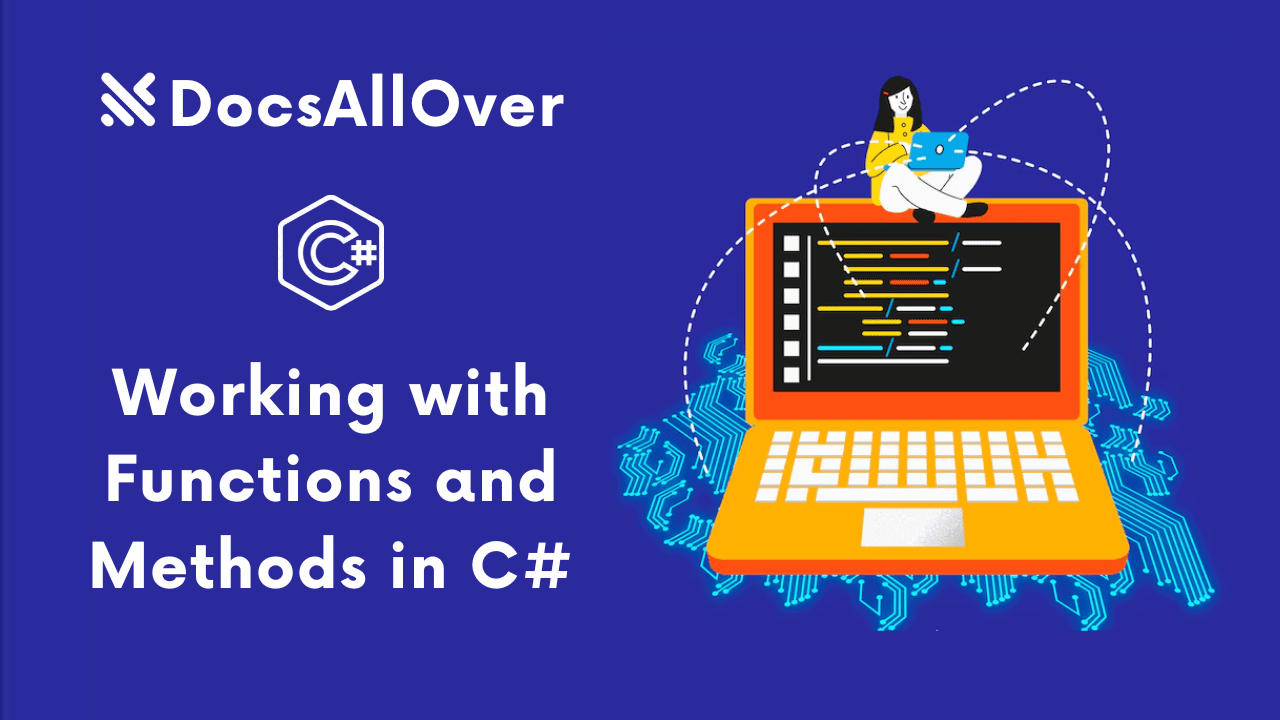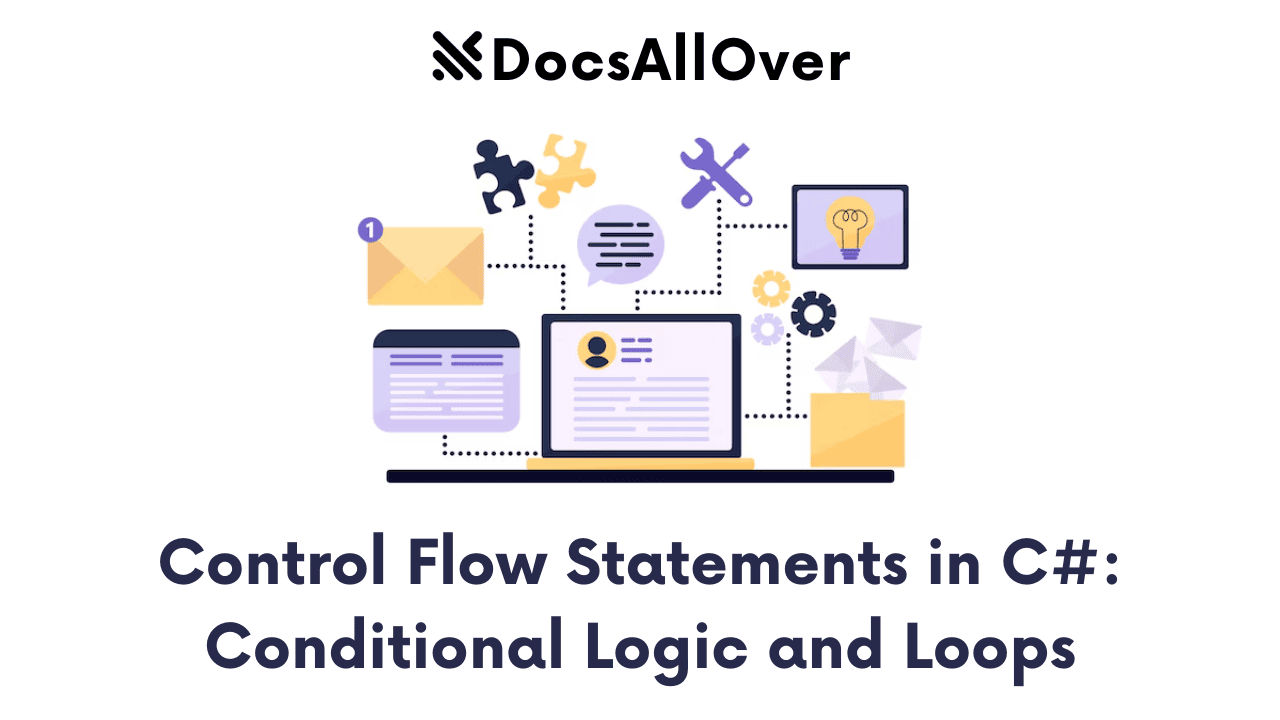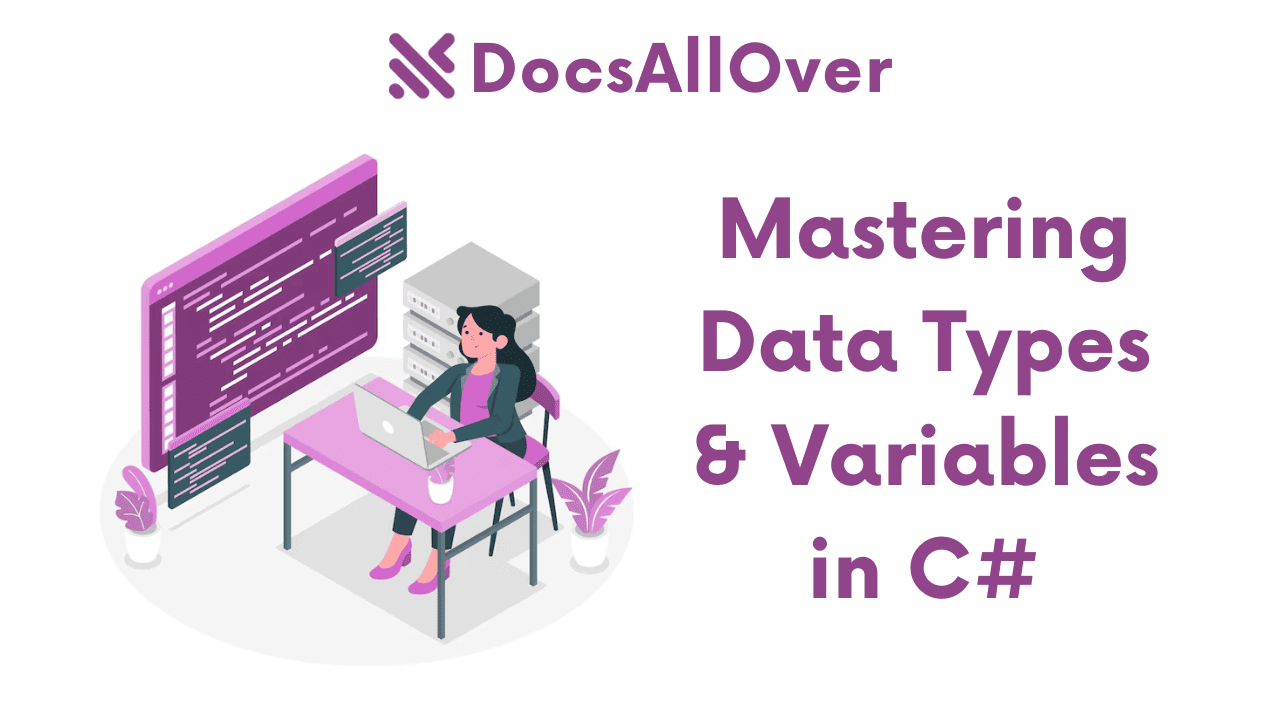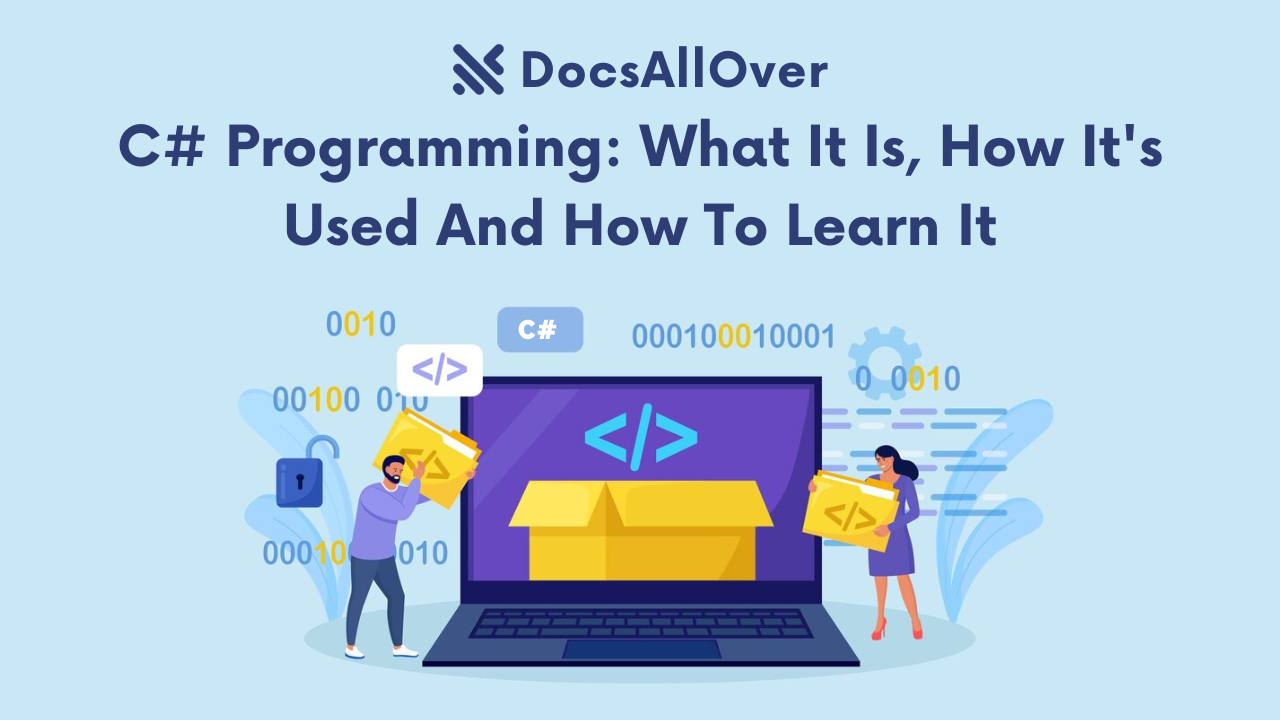5 Reasons to Choose C# for Your Next Programming Project

Introduction: Unveiling the Power of C# for Your Next Project
C#, a versatile and powerful programming language, has carved a significant niche in the ever-evolving world of software development. Designed by Microsoft as a cornerstone of the .NET framework, C# offers a robust and feature-rich environment for building a wide range of applications. From complex enterprise solutions to user-friendly mobile apps and cutting-edge games, C# empowers developers to bring their visions to life.
This blog post delves into the compelling reasons why C# should be a strong contender for your next programming project. We'll explore the language's strengths, its extensive capabilities, and the advantages it offers developers of all experience levels. By the end of this exploration, you'll gain valuable insights into how C# can streamline your development process, enhance your application's functionality, and ensure its long-term maintainability.
C#: Sharper Than Ever - Why It's the Right Choice for You
1. Versatility and Wide Range of Applications
C# shines brightly when it comes to its adaptability across various development landscapes. Unlike some languages confined to specific domains, C# empowers you to tackle a remarkable range of project types, from traditional desktop applications to cutting-edge cloud solutions. Let's delve into this versatility and explore the diverse applications C# can bring to life:
- Desktop Applications: C# remains a dominant force in crafting feature-rich desktop applications. Leveraging frameworks like Windows Presentation Foundation (WPF) or Windows Forms, C# enables developers to build user-friendly interfaces and powerful functionalities for desktop environments. From productivity tools to complex design software, C# is a reliable choice for these applications.
- Web Development (Backend and Full-Stack): C# isn't just for desktops! The ASP.NET framework, built on top of .NET, unlocks the potential of C# for web development. ASP.NET caters to both backend and full-stack development. ASP.NET Core, a modern iteration, streamlines backend API development and microservices. Popular frameworks like ASP.NET MVC empower full-stack development, allowing C# to handle both server-side logic and interaction with web interfaces.
- Game Development (through Unity): C# plays a central role in Unity, a widely adopted game engine. Unity utilizes C# for scripting, enabling developers to program game logic, character behavior, and user interaction within the engine's intuitive interface. From immersive 3D games to interactive mobile experiences, C# serves as the foundation for bringing game concepts to life in Unity.
- Mobile Applications (with Xamarin): The mobile app revolution hasn't left C# behind. Xamarin, a cross-platform development framework built with C#, allows you to create native mobile applications for iOS and Android using a single codebase. This code-sharing capability translates to faster development times and a more streamlined workflow.
- Cloud-Based Systems: As cloud computing continues its ascent, C# offers a robust platform for building scalable and secure cloud-based systems. The .NET framework extends its reach to Azure, Microsoft's cloud platform, providing tools and libraries for developing and deploying cloud applications with C#. This empowers you to create APIs, microservices, and distributed systems that leverage the power of the cloud.
Real-World Examples of C# Applications:
To illustrate C#'s versatility, here are some prominent applications built with this powerful language:
- Desktop Applications: Microsoft Visual Studio (the IDE you're likely using to read this!), Adobe Photoshop Elements, and Autodesk Revit (Building Information Modeling software) are just a few examples.
- Web Applications: Stack Overflow, the massive Q&A platform for programmers, utilizes ASP.NET for its backend functionality. Similarly, Skype, the widely used communication app, has C# at its core.
- Games: The popular MMORPG (Massively Multiplayer Online Role-Playing Game) World of Warcraft utilizes C# for its server-side scripting, along with other games like Unity-developed Pokemon Go.
- Mobile Applications: Xamarin boasts a range of successful mobile apps built with C#, including Erica, a finance management app, and the ever-popular mobile version of Pinterest.
C#'s ability to seamlessly navigate between these diverse project types makes it a highly attractive choice for developers. Whether you're building a desktop application, crafting a web API, or bringing a game to life, C# offers the tools and capabilities to turn your vision into reality.
2. Easy to Learn and Use: A Smooth Transition for Programmers
One of the biggest advantages of choosing C# for your next project is its approachable nature. If you're already familiar with programming languages like C++ or Java, you'll find the transition to C# remarkably smooth. This is thanks in large part to its intuitive syntax, which shares many similarities with these established languages.
- Familiar Syntax for a Quick Start
C# boasts a clean and concise syntax that follows a logical structure. Programmers coming from C++ or Java will find many familiar elements, including:
- Similar keywords: Core keywords like
if,else,for,while, andreturnhave the same meaning and functionality in C# as they do in these other languages. This consistency reduces the learning curve and allows you to focus on the specifics of C#. - Comparable data types: C# utilizes data types like
int,double,string, andboolthat are directly analogous to their counterparts in C++ and Java. This makes it easier to understand and work with data within your C# programs. - Object-oriented concepts: If you're familiar with object-oriented programming (OOP) principles in C++ or Java, you'll be right at home with C#. C# embraces OOP concepts like classes, objects, inheritance, and polymorphism, allowing you to leverage your existing knowledge to build well-structured and maintainable C# applications.
- Similar keywords: Core keywords like
- Learning Resources Galore
Beyond its inherent familiarity, C# benefits from a wealth of learning resources that make it an excellent choice for beginners and experienced programmers alike. Here's what you can expect:
- Abundant online tutorials: Numerous online platforms offer comprehensive C# tutorials, from basic syntax introductions to advanced topics like multithreading and asynchronous programming. These tutorials often cater to different learning styles, providing interactive exercises, video lectures, and written explanations.
- Detailed documentation: Microsoft, the creator of C#, provides extensive and up-to-date documentation that covers every aspect of the language. This documentation serves as an invaluable reference guide, offering in-depth explanations, code examples, and best practices for writing efficient and robust C# code.
- Active and supportive community: The C# developer community is vast and welcoming. Online forums, communities, and social media groups provide excellent platforms to connect with other C# programmers, ask questions, share knowledge, and find solutions to challenges you might encounter during development.
With its intuitive syntax and wealth of learning resources, C# makes it easy for programmers with experience in C++ or Java to pick up the language quickly and start building powerful applications. This smooth learning curve translates into faster development cycles and increased productivity for your projects.
Here's a brief code example comparing a simple loop in C++ and C#:
C++
C#
As you can see, the code structure and logic for the loop are nearly identical in both languages. This consistency makes learning C# a breeze for programmers with a background in C++ or Java.
Beyond its inherent similarities to other languages, C# also benefits from a wealth of learning resources available online and within the developer community. Microsoft, the creator of C#, provides extensive official documentation covering every aspect of the language. Numerous online tutorials, courses, and video lectures cater to learners of all experience levels. Additionally, the vast and active C# developer community offers invaluable support through forums, Q&A platforms, and online communities. This abundance of resources ensures that you'll find the help you need whenever you encounter challenges during your C# development journey.
By combining its intuitive syntax, familiarity for programmers with existing OOP knowledge, and a rich ecosystem of learning resources, C# makes itself an excellent choice for beginners and experienced developers alike. Whether you're transitioning from C++ or Java or embarking on your first foray into object-oriented programming, C# offers a smooth learning curve and empowers you to start building robust applications quickly.
3. Modern Language with Focus on Productivity
C# goes beyond its powerful object-oriented foundation to provide features that significantly boost developer productivity. Here's how C# streamlines the development process:
- Strong Typing: C# enforces strict data types for variables. This means you explicitly declare the type of data a variable can hold (e.g., integer, string, boolean). This strong typing offers several advantages:
- Improved Code Reliability: By catching type mismatches at compile time, C# helps prevent runtime errors that can crash your application. This early detection allows you to fix issues before your code reaches production.
- Enhanced Code Clarity: Strong typing improves code readability. When looking at a variable declaration, you immediately understand the type of data it can store. This clarity makes code easier to maintain, both for yourself and your fellow developers.
- Garbage Collection: C# employs automatic garbage collection, a feature that alleviates the burden of manual memory management. In languages like C++, developers are responsible for allocating and deallocating memory for objects. This can be error-prone, leading to memory leaks or dangling pointers. C# handles memory management automatically, freeing developers to focus on core application logic.
- LINQ (Language Integrated Query): C# integrates LINQ (Language Integrated Query) technology, providing a powerful and concise way to work with data collections. LINQ offers a query syntax that resembles natural language, making it easy to express data manipulation logic. Here's an example of a simple LINQ query to filter a list of products based on their price:
This code snippet filters the products list and assigns the result (products with prices exceeding 100) to the expensiveProducts variable. LINQ offers a variety of operators for filtering, sorting, grouping, and transforming data, simplifying complex data access tasks.
- Clean Syntax: C# boasts a clean and readable syntax that resembles other popular languages like Java and C++. This consistency makes it easier for developers with experience in other languages to pick up C# quickly. Additionally, C# avoids unnecessary syntactic elements, promoting code clarity and maintainability.
These features, combined with C#'s rich ecosystem of libraries and tools, contribute to a development environment that empowers programmers to be more productive and efficient.
4. Robustness, Security, and Scalability
C# prioritizes the creation of reliable, secure, and scalable applications. Here's how it empowers developers to build robust systems:
- Static Typing: Early Error Detection
C# enforces strict type checking at compile time. This means that the data type of a variable must be explicitly declared, and the compiler verifies type compatibility throughout the code.
This approach helps catch errors early in the development process, preventing runtime exceptions that can crash your application. For instance, attempting to assign a string value to an integer variable will be flagged as a type mismatch during compilation, saving you time and frustration from debugging runtime issues later.
- Null-Reference Checks: Preventing Crashes
C# enforces null-reference checks, ensuring that you don't attempt to access properties or methods of a variable that might be null. This helps prevent a common source of runtime errors known as NullReferenceExceptions.
The compiler analyzes your code and identifies potential scenarios where a variable might be null before being accessed. It can then warn you about these situations, prompting you to add null checks or handle null values appropriately. This proactive approach significantly reduces the risk of unexpected crashes.
- Security Features: Built-in Safeguards
C# offers a rich set of built-in security features that streamline the development of secure applications. These features include:
- Authentication: Mechanisms like membership providers and identity frameworks enable you to verify user credentials and control access to different parts of your application.
- Authorization: You can define authorization rules to grant or deny permissions to users based on their roles or claims. This ensures that only authorized users can perform specific actions within the application.
- Data Encryption: C# provides classes like
System.Security.Cryptographyfor encrypting sensitive data at rest and in transit. This helps protect confidential information from unauthorized access, even if it's intercepted.
By leveraging these features effectively, you can build applications that are resistant to common security threats like unauthorized access, data breaches, and SQL injection attacks.
- Scalability: Handling Growth with Confidence
C# applications are well-suited for building large-scale, enterprise-level systems. The language and the .NET platform provide robust features that enable your applications to handle increasing data volumes and complex functionalities. Here are some key aspects that contribute to scalability:
- Garbage Collection: C# employs automatic memory management through garbage collection. This frees developers from the burden of manual memory management, which can become error-prone and inefficient in large applications. The garbage collector automatically reclaims unused memory, ensuring that your application has sufficient resources available for ongoing operations.
- Just-In-Time (JIT) Compilation: C# code is compiled into machine code at runtime using JIT compilation. This allows the application to adapt to the specific hardware it's running on, potentially improving performance. Additionally, JIT compilation enables features like dynamic code generation, which can be useful for certain scenarios.
- .NET Framework Libraries: The .NET Framework offers a vast collection of well-tested and optimized libraries that can be leveraged to streamline common development tasks. These libraries provide efficient implementations for data access, networking, threading, and various other functionalities. By utilizing these libraries, you can focus on the core logic of your application without reinventing the wheel for essential tasks.
5. Continuous Evolution and Bright Future
C# isn't a stagnant language; it's one that thrives on continuous improvement and innovation. This ongoing development is a major reason why C# remains a popular and relevant choice for programmers today. Here's a closer look at what keeps C# sharp:
- Microsoft's Commitment: A Stream of Enhancements
Microsoft, the creator of C#, is deeply invested in its language's growth. They consistently release new versions with a focus on adding powerful features, improving performance, and streamlining development processes. These updates address developer needs and incorporate valuable feedback from the C# community.
For instance, C# 7 introduced features like pattern matching, which simplifies complex conditional logic. C# 8 brought nullable reference types, enhancing code safety and reducing the possibility of null reference exceptions. These are just a few examples of how Microsoft's dedication keeps C# evolving and adapting to the ever-changing programming landscape.
- Active Community Contributions: Expanding the Ecosystem
The C# community is another driving force behind the language's continuous improvement. A vast network of developers contributes to the rich ecosystem of libraries and frameworks available for C#. These open-source projects cater to a wide range of functionalities, from web development and data access to machine learning and cloud integration.
The .NET Foundation, a non-profit organization that supports open-source development for .NET (the platform on which C# runs), plays a crucial role in fostering this community. The foundation provides resources, tools, and infrastructure for developers to collaborate and contribute to the C# ecosystem. This collaborative spirit ensures a constant stream of innovative libraries and frameworks that empower C# developers to tackle complex programming challenges.
- Embracing Modern Trends: Staying Relevant in the Evolving Landscape
C# doesn't shy away from incorporating modern programming advancements. The language has embraced trends like asynchronous programming, which allows applications to handle multiple tasks concurrently without sacrificing responsiveness. This is particularly beneficial for building user interfaces that remain smooth and interactive even when dealing with long-running operations.
Cloud integration is another area where C# shines. With the rise of cloud computing, C# has evolved to seamlessly integrate with various cloud platforms like Microsoft Azure and Amazon Web Services. This enables developers to leverage the scalability and flexibility of the cloud for their C# applications.
By staying attuned to modern trends and incorporating them into the language, C# ensures that developers have the tools and capabilities to build robust, scalable, and future-proof applications.
In conclusion, C#'s commitment to continuous development, fueled by Microsoft's dedication, a vibrant community, and the adoption of modern trends, positions it as a language that will continue to be a strong contender in the ever-evolving world of programming. Whether you're a seasoned developer or just starting out, C# offers a powerful and versatile foundation for building your next programming project.




